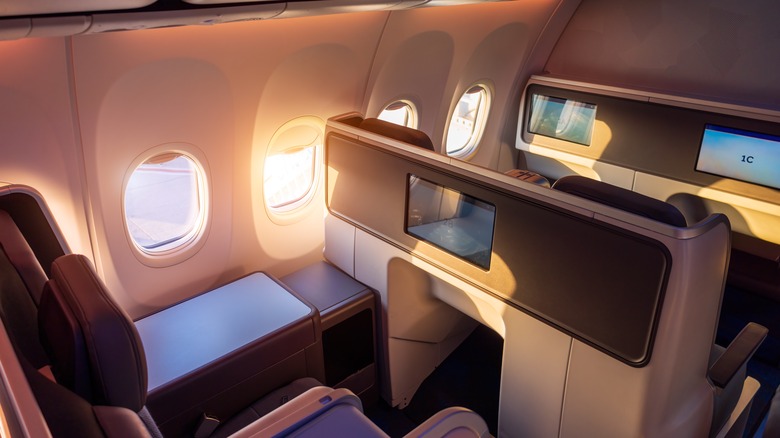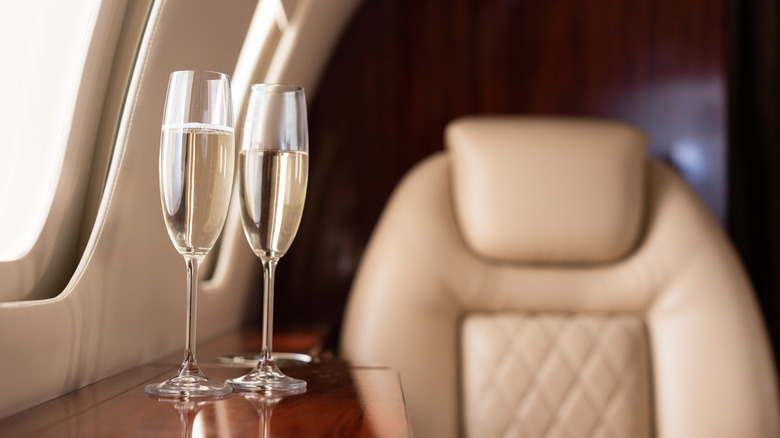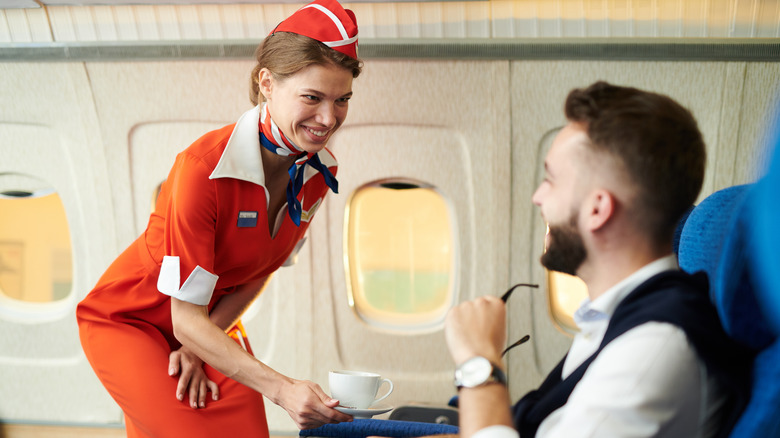Here's Why Popular Airlines Are Ditching First Class
It wasn't long ago when airlines offered a wider variety of cabin classes within their fleets, including the once-staple first class option. Despite being considered the most elite class, there is a shrinking number of carriers with these cabins. The reason? First class isn't exactly making airlines money — or at least not how it used to.
In October 2022, American Airlines announced the removal of first class from its international flights, citing poor sales as the primary reason. The company's chief commercial officer, Vasu Raja, explained it bluntly in an earnings call: "The first class will not exist ... at American Airlines for the simple reason that our customers aren't buying it." Qatar Airways announced a similar change shortly after, offering more or less the same justification. It made a surprising revelation in January 2023 that it would forego first class in its subsequent fleets, with its CEO, Akbar Al Baker, explaining that it's no longer worth the investment. "Why should you invest in a subclass of an aeroplane that already gives you all the amenities that first class gives you," he said via Arabian Business. "I don't see the necessity."
This trend of phasing out first class cabins appears to reflect a change in traveler behavior as well. In other words, many passengers no longer see the value in paying a premium for them, especially when business class offers comparable benefits. Moreover, deep-pocketed travelers often have access to private jets anyway. Just ask Taylor Swift.
Demand for these seats is dwindling
Can you confidently point out the key differences between first and business class cabins? Nowadays, you likely can't. Business class seats have become so feature-packed that they are now the most coveted cabins, giving airlines the impetus to nix first class entirely. Soon-to-launch Saudi Arabian airline Riyadh Air even made the decision to exclude first class from its inaugural fleet.
"It's clear that many airlines are focusing on their business class product and moving away from a dedicated first class product," the company's CEO, Tony Douglas, shared with Airport Industry Review. "At Riyadh Air, we feel that first class is not an efficient use of the real estate on the aircraft and that could be put to better use with a three cabin product that includes business class, premium economy and economy." This simply means that even if passengers have fewer choices in terms of cabins, airlines' dedication to enhancing their remaining classes guarantees travelers a top-notch experience. "By having an incredible business class product with this laser focus on passengers across all touchpoints, it will ensure our guests feel valued – regardless of their cabin of travel," Douglas added.
American Airlines' Vasu Raja echoed the same sentiment, sharing in the same earnings call that travelers have been gravitating more towards business class, making it the focal point for airline investment. "The quality of the business class ... has improved so much," he noted. "And frankly, by removing it, we can go provide more business class seats, which is what our customers most want or most willing to pay for."
First class cabins aren't totally obsolete
While some airlines are dropping first class cabins, don't expect them to disappear completely. Even though the demand for them isn't the same, there is still a subset of travelers hankering for exclusive experiences and airlines that are happy to cater to their whims. Delta, for instance, has first class cabins outfitted with full-height doors, Singapore Airlines has installed full-on suites with double beds for jetsetting couples, and Emirates boasts private shower spas for first class patrons. For these high flyers, the premium price tag is a small exchange for unparalleled luxury. "Getting from A to B isn't necessarily what they're selling anymore. Anyone can do that," aviation expert Edward Dryden told CNBC. "It's that experience within the cabin." As long as there are customers willing to pay for these opulent experiences, airlines will likely continue to provide them.
And so, while the rest of us are looking for ways to save on airfare, the rich aren't feeling much of a pinch. "We don't only see it aviation," Lufthansa CEO Carsten Spohr said via Bloomberg. "You see it in high-end cars, you see it in high-end watches, you see it in high-end luxury products. Look at LVMH in France, look at the German car manufacturers. There is a general trend towards luxury, towards premium for those people who can afford it. Travel is surely part of that."


